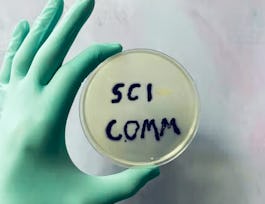In this course, you will continue to explore how to develop and implement evidence-based methods for science communication. Here we’ll be looking at the softer but no less important side of science communication. We’ll cover the basics of human emotion, building connection with your audience through empathy and authenticity, how improv can improve your science communication game, non-verbal communication, and managing adversity in science communication. We’ll close with a discussion of how to be an inclusive and trauma-informed science communicator.


The Softer Side of Science Communication
This course is part of Designing Effective Science Communication Specialization
Taught in English

Instructor: Melanie Peffer
Included with 
Course
Recommended experience
What you'll learn
Explain the role of emotion in human behavior and how it can come up in science communication.
Explain why authenticity, trust, and empathy will help foster connection and consequently science communication.
Explain how improvisation, storytelling, and nonverbal communication can improve your science communication activities.
Describe how to be an inclusive and trauma informed science communicator.
Skills you'll gain
Details to know

Add to your LinkedIn profile
2 quizzes
Course
Recommended experience
See how employees at top companies are mastering in-demand skills

Build your subject-matter expertise
- Learn new concepts from industry experts
- Gain a foundational understanding of a subject or tool
- Develop job-relevant skills with hands-on projects
- Earn a shareable career certificate


Earn a career certificate
Add this credential to your LinkedIn profile, resume, or CV
Share it on social media and in your performance review

There are 4 modules in this course
In this module, you will learn about human emotions.
What's included
4 videos3 readings1 quiz1 discussion prompt1 plugin
In this module, you will discuss the importance of fostering trust in science communication. We will also discuss how to use empathy, vulnerability, and authenticity to do so. Finally, the third part of this module will talk about the use of storytelling, improvisation and non-verbal communication to build connection with your audiences.
What's included
5 videos8 readings1 peer review3 discussion prompts
In this module, you will learn about conflict and science communication. We will also discuss strategies for managing active conflict and/or adversarial audiences.
What's included
3 videos1 reading1 quiz2 discussion prompts
In this module, we will discuss how to be inclusive science communicators. This includes how to be trauma informed, the balance of power in communication, designing for inclusion, and how to be culturally relevant. We'll close with a discussion of an ethical code for science communicators.
What's included
4 videos8 readings1 peer review2 discussion prompts
Instructor

Offered by
Recommended if you're interested in Education

University of Colorado Boulder

University of Colorado Boulder

Universitat de Barcelona

University of Colorado Boulder
Why people choose Coursera for their career





Open new doors with Coursera Plus
Unlimited access to 7,000+ world-class courses, hands-on projects, and job-ready certificate programs - all included in your subscription
Advance your career with an online degree
Earn a degree from world-class universities - 100% online
Join over 3,400 global companies that choose Coursera for Business
Upskill your employees to excel in the digital economy
Frequently asked questions
Access to lectures and assignments depends on your type of enrollment. If you take a course in audit mode, you will be able to see most course materials for free. To access graded assignments and to earn a Certificate, you will need to purchase the Certificate experience, during or after your audit. If you don't see the audit option:
The course may not offer an audit option. You can try a Free Trial instead, or apply for Financial Aid.
The course may offer 'Full Course, No Certificate' instead. This option lets you see all course materials, submit required assessments, and get a final grade. This also means that you will not be able to purchase a Certificate experience.
When you enroll in the course, you get access to all of the courses in the Specialization, and you earn a certificate when you complete the work. Your electronic Certificate will be added to your Accomplishments page - from there, you can print your Certificate or add it to your LinkedIn profile. If you only want to read and view the course content, you can audit the course for free.
If you subscribed, you get a 7-day free trial during which you can cancel at no penalty. After that, we don’t give refunds, but you can cancel your subscription at any time. See our full refund policy.

